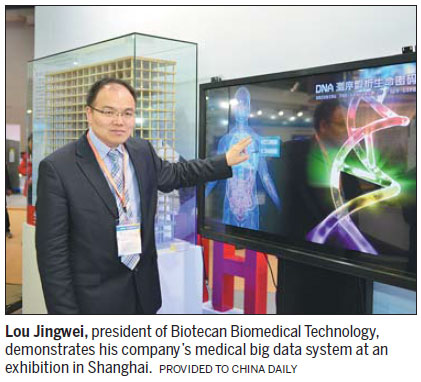Academic, industrial cooperation leads precision medicine
Biomedicine and healthcare have long been among the most important industries of the Zhangjiang National Innovation Demonstration Zone in Shanghai. In recent years, Zhangjiang has been establishing public service platforms to further serve the development of its core industries.
One of the latest is a bio-manufacturing technology service platform. Established at the end of 2016, the platform aims to facilitate development of the antibody and virus vaccine industry. The platform can provide services for 10 or more antibody and vaccine products at the same time. It can also provide technological and industrialization services for five to eight antibody and vaccine enterprises.
The platform was established by Shanghai Bioengine Biotechnology Co. Based on the State's Key Laboratory of Bioreactor Engineering at the East China University of Science and Technology and researchers' rich experience with animal cell cultivation technology, the company has established a plethora of scientific technologies, such as large-scale and high-density animal cell cultivation technology, individualized free serum and free protein production technology, virus infection and replication control technology and bioreactor system design and manufacturing technology.

It also formed an industrialization system for biopharmaceutical products by integrating products, technology and bioreactors.
The Zhangjiang zone has constantly promoted the application of big data technology in the healthcare industry and the development precision medicine.
In recent years, precision medicine has become a buzzword around the world's healthcare and medical circles. It incorporates customized healthcare through medical decisions, practices and products, which are tailored to the individual's needs.
China has also been embracing precision medicine in a larger scale with a number of medical organizations, academic institutions and enterprises involved in the field. The Chinese government has also been preparing related projects to develop more targeted diagnoses and treatments for specific diseases through advanced medical science and technology.

"The essence of precision medicine is the result of the integration of biotech and digital technology. It is used to analyze and dig into medical data. A new era of medical science has been unveiled," said Lou Jingwei, president of Biotecan Biomedical Technology Co Ltd, one of Zhangjiang's enterprises focusing on precision medicine and medical big data.
The company has been collecting massive stores of genetic and clinical performance data to support treatment procedures since its establishment in 2008. It specializes in the integration and analysis of medical data, precision medicine, drug testing and translational medical research.
In addition to participating in construction of the Zhangjiang Innovation Demonstration Medical Big Data Service Platform in 2014, the company has also worked to create the world's largest hospital lab network in China.
It has built more than 80 molecular medical diagnostic centers across the country, according to Lou.
Lou added that the company has collected large amounts of esophageal cancer samples and has conducted genome sequencing on more than 1,000 of its 507,000 samples.
Apart from oesophageal cancer, Biotecan also has a significant amount of data on diseases such as pancreatic, prostate and liver cancers.
In a bid to better analyze medical big data, Biotecan cooperated with Shanghai's Fudan University to establish the Fudan Zhangjiang Clinical Gene Research Center in 2013.
It also established a scientific research network with the best hospitals in the country. A huge amount of medical data is produced from labs and big data centers in the network, providing a solid foundation for Biotecan's research and development.
The development of genomics, metabolomics and proteomics allows physicians to design more effective treatment plans for most patients, which in turn aids in the development of precision medicine, Lou said.
wanghongyi@chinadaily.com.cn
(China Daily 05/15/2017 page35)














